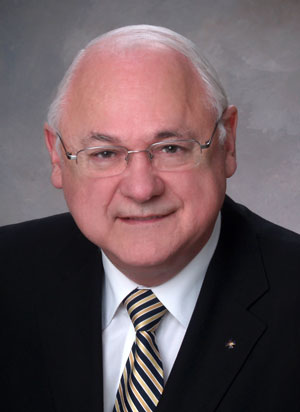A former Canadian Bar Association president and one of Canada’s foremost experts on military law are both expressing concern about the appointment of the organization’s chief executive officer to an honorary position with the legal branch of the Department of National Defence.

John Hoyles became honorary colonel to the office of the judge advocate general last February, according to a recent article in the CBA’s electronic newsletter.
According to the article, the position comes with responsibilities that include meeting with lawyers in the judge advocate general’s office “to talk about the importance of their roles” and “helping to educate and raise awareness of lawyers in military towns about the differences between military and civilian law.” The term is for three years with the possibility of renewal.
Eugene Meehan, a former CBA president and a partner at Supreme Advocacy LLP in Ottawa, says the appointment will seriously compromise the CBA’s ability to take positions on military justice issues.
“The problem is that the Canadian Bar Association, by making this honorary appointment, have basically taken themselves out of the game,” says Meehan.
“They diminish their position whereby they can neither speak for nor against any position regarding military justice with credibility.”
Meehan also expresses concern about the fact that the matter of allowing Hoyles to take the position wasn’t subject to a formal vote before the CBA council.
“Why wasn’t there a vote before the national council?” he asks.
“That’s odd.”
Michel Drapeau, a retired colonel with the Canadian Armed Forces, author of the only annotated text on the National Defence Act, and an adjunct professor of law at the University of Ottawa, agrees that Hoyles now faces “at the very least an appearance” of a conflict of interest.
“Because of his position, he is in some ways a Siamese twin,” says Drapeau. If Hoyles were now to speak of military justice issues, “I’d be the first to say, ‘You’re advocating for something that you’re very close to and a part of,’” he says.
“Effectively, he’s being silenced in that particular field.”
Moreover, according to Drapeau, the appointment comes at a time of increased interest in the idea of putting the Canadian military justice system under civilian authority, something that’s already the case in Britain, Germany, France, and other European countries.
“Increasingly, there is a clamour, if not for change, certainly for a review of some of the aspects of the National Defence Act as written,” he says.
The CBA “should be taking a position and being at the forefront, but they’re not. They’re being totally, totally, totally silent,” he adds.
The CBA has also been unusually silent about other issues related to military justice, according to Meehan and Drapeau, who cite those described in the report by former Supreme Court justice Marie Deschamps on sexual misconduct and sexual harassment in the Canadian Armed Forces this spring.
But CBA president Michele Hollins strongly denies that Hoyles’ appointment should suggest even the perception of a conflict of interest.
“I think that to allege a conflict or even a perceived conflict is in my view to misunderstand the role of the CEO and, I think, the nature of the honour,” says Hollins.
On the one hand, she says, Hoyles’ new position wouldn’t allow him to influence policy at the judge advocate general; on the other, his existing position as chief executive officer doesn’t allow him to affect CBA policy.
“This is in all respects an honorary appointment, it’s an honorary title,” she says.
“So, certainly, he’s got no operational role or policy role with JAG. . . . I’m sort of struggling to understand what Mr. Drapeau does not understand about an honorary title. In terms of his role with the Canadian Bar Association, the CEO . . . does not set policy, particularly on issues of advocacy. The position of the organization on any given issue is determined by the volunteer leadership, reflective of the membership. It is not determined by staff.”
She says the executive examined the matter very carefully when questions of this sort first arose and satisfied themselves that Hoyles’ new position wouldn’t place him in any sort of conflict.
CBA rules, she says, don’t require it to put a matter like Hoyles’ appointment to a vote before the national council.
“The executive officers have the ability to make that decision and did. We have the authority to do that,” she says.
Asked about the CBA’s alleged silence on military justice issues such as the Deschamps report, Hollins points to work done by the association’s women lawyers forum on sexual harassment. “This kind of thing fits directly into that, so we didn’t think that [the Deschamps report] necessarily required a separate response given that we are expressly and clearly well aware of the issues of sexual harassment in our society in general and are beginning that conversation with our own profession,” she says.
David Bright, a partner at Boyne Clarke LLP in Halifax who practises military law, says he doesn’t see a problem with Hoyles’ appointment.
“I don’t see it as a conflict. I’m an honorary colonel at one of the air force bases here, which never caused a conflict problem for me. I defend without hesitation. It’s an honorary position and very much a PR position.”
The only conceivable conflict with Hoyles’ role, says Bright, would be if the CBA wanted to speak out against the judge advocate general. But the CBA, he notes, normally speaks out on legislation rather than particular institutions.
“I can’t recall the Canadian Bar [Association] ever being critical of an organization,” says Bright.

 John Hoyles became honorary colonel to the office of the judge advocate general last February, according to a recent article in the CBA’s electronic newsletter.
John Hoyles became honorary colonel to the office of the judge advocate general last February, according to a recent article in the CBA’s electronic newsletter.